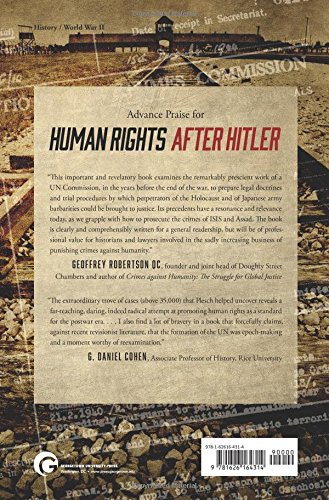


Full description not available
M**R
Exposing the Importance of the UNWCC
With the end of the Second World War, the victorious Allied powers set up a series of international criminal trials to bring to justice the leaders and war criminals of the various defeated Axis powers. The Nuremberg and Tokyo War Crimes Trials are often considered the pinnacle of this pursuit of justice, developing new concepts in international law to administer “legal accountability” to the leadership of Germany and Japan. However, these two trials represented only a small fraction of the overall pursuit of justice for crimes against humanity. Ever since 1943, the United Nations War Crimes Commission (UNWCC) had been working diligently to catalogue and create the legal framework needed to pursue both national and international trials, with defendants numbering into the thousands. Yet, as Dan Plesch points out in Human Rights After Hitler: The Lost History of Prosecuting Axis War Crimes, the work of the UNWCC was largely overshadowed by the rise of geopolitical tensions between east and west, to the point that its accomplishments remain largely forgotten; its precedents ignored by even the international judicial system. Plesch instead argues that the UNWCC’s work must be recognized by the wider justice community for its critical precedent, as well as its identifying and gathering of evidence of the Holocaust well before its public recognition and acceptance in the West. Plesch also dispels as objectively false the widespread belief that rape was not considered a war crime until well late in the 20th century by relating the UNWCC’s “cover[ing] violence that specifically targeted women” and both sexual and gender-based crimes ranging from rape to sterilization. Thus, the UNWCC, its archives overzealously guarded and restricted from access until Plesch himself led the effort to reveal them, was actually at the cutting edge of pursing justice for war crimes. Of special note in Plesch’s discussion of the UNWCC’s work is how international the UNWCC operated, working with a multitude of nations to pursue justice for war crimes and establish international precedent, bringing “cases against more than 36,000 individuals….” This is, in Plesch’s view, essentially a lost history of international criminal justice, with “utterly inadequate recognition of the practical vision and actions of…people…who sought not merely revenge, but justice….” Such justice extended beyond the traditional timeframe of the Second World War, as Ethiopia sought to bring Italian generalship and political leaders to justice for war crimes during the Italian invasion of Ethiopia in 1935. Plesch sees this successful partnership with the UNWCC as a correction to the traditional narrative of Afro-ICC relations, showing that the UNWCC was willing to support African claims, even against political pressure from Washington. Through his showcasing of various non-Western nations and their use of the UNWCC, Plesch manages to not only bring the UNWCC into the modern discussion of international war crimes precedent, but also reframes the idea of modern war crimes law from being solely a Western creation into sharing a global patrimony. The active participation of Ethiopia, China, and India clearly demonstrate a more internationalist definition for crimes against humanity through the participation of thousands of legal analysts. Though much work remains to be done with the recently accessible UNWCC archives to fully understand its importance to the historical pursuit of justice for war crimes, Plesch’s work stands as a testimony to its importance and the need for further research that, as Plesch sees it, can “provide the additional moral courage and political arguments needed to revitalize the global human rights agenda….”
G**R
Good, but...
A clear, coherent, scholarly volume about important matters but dry as a six-to-one Martini. Primarily for lawyers, WWII buffs and insomniacs.
D**Z
Human Rights after Hitler.
Bought as a gift for a person into World War II history.
D**5
Well-written and fascinating
A well-written, accessible and cogently argued examination of the of the UN War Crimes Commission, its establishment, its extensive, ground breaking work, its premature closure and its subsequent - scandalous - concealment from public view.Dry, academic tome this is emphatically not. As a moderately-informed general reader, with an interest in what really goes on behind the scenes, I found both the legal and historical information fascinating. The author's exposition of the causes of the UNWCC's demise and suppression: political expediency and national self-interest in the US and UK - and the lost opportunities for justice that ensued - is particularly compelling.
J**R
Fantastic read - what at first glance seemed looked like ...
Fantastic read - what at first glance seemed looked like it could be heavy going was in fact difficult to put downWell done Dan
A**L
dry as dust but important subject
I'm at the beginning of Chapter 5: The Holocaust Indictments: Prosecuting the "foot soldiers of atrocity." So far it's dry as dust. Plesch is not a very engaging writer. It's an important subject, but his book, so far, anyway, isn't much more than a list of speeches various Allied leaders made, and commissions they set up, during World War 2, to prosecute Axis war crimes.Plesch makes the point that Allied efforts to punish war criminals set an important precedent toward seeing that modern and future war criminals are prosecuted. If you're interested in this whole business of dealing with war crimes, you'll find this book worthwhile.I've finished it now. It's all right. Plesch deserves credit for including in his appendices, ,"An Early UNWCC Charge File against a Group of Germans Involved in the Treblinka Death Camp and "An Early Polish Charge File against a Group of Germans Involved in the Concentration Camp System." Both are from 1944.
M**N
Four Stars
A bit of a tedious read, but well worth it. Most informative and enlightening.
Trustpilot
4 days ago
1 day ago